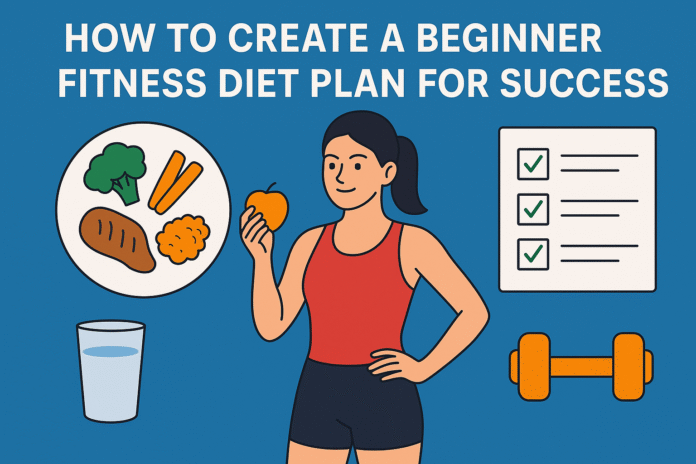Table of Contents
How to Create a Beginner Fitness Diet Plan for Success
You’ve made the decision. You’ve bought the gym membership, dug the running shoes out of the closet, or finally pressed play on that workout video. You’re ready to get fit. But as you stand in the kitchen, looking at a fridge full of food, a daunting question arises: “What am I supposed to eat?” How to Create a Beginner Fitness Diet Plan for Success
This moment is where countless well-intentioned fitness journeys stumble. Exercise is only half the battle. Your body is built in the kitchen, fueled by the choices you make at every meal. The world of fitness nutrition is a minefield of conflicting advice: “Carbs are bad!” “No, fat is the enemy!” “Eat six small meals a day!” “Intermittent fasting is the only way!”
It’s enough to make anyone want to order a pizza and give up.
But it doesn’t have to be that way. Building a successful beginner fitness diet plan isn’t about perfection, extreme restriction, or following the latest fad. It’s about understanding a few foundational principles and building a sustainable, enjoyable eating pattern that supports your new active lifestyle. This guide will walk you through how to create that plan, step by step, without overwhelm.
🥗 Beginner Fitness Diet Plan for Success
🔑 1. Define Your Fitness Goal
Before planning your diet, clarify your primary goal:
- Fat loss
- Muscle gain
- Improved energy & health
- Athletic performance
Your nutrition should align with your goal. For example:
- Fat loss = calorie deficit
- Muscle gain = calorie surplus
- Maintenance/health = balanced calories
🧮 2. Calculate Your Calorie Needs
Use a Total Daily Energy Expenditure (TDEE) calculator to estimate how many calories you need.
Rough estimate:
- Men: 15–17 calories per lb of body weight
- Women: 13–15 calories per lb
Then:
- For fat loss: Eat ~300–500 calories below TDEE
- For muscle gain: Eat ~250–500 calories above TDEE
🍗 3. Focus on Macronutrient Balance
Break your calories into macros:
🥩 Protein
- Builds and maintains muscle
- Aim: 0.7–1g per lb of body weight
🍚 Carbohydrates
- Main energy source
- Adjust based on training intensity
🥑 Fats
- Supports hormones and brain health
- Aim: 0.3–0.4g per lb of body weight
📋 4. Choose Whole, Nutrient-Dense Foods
Stick to 80–90% whole foods:
- Proteins: Chicken, turkey, lean beef, tofu, lentils, eggs, Greek yogurt
- Carbs: Brown rice, oats, sweet potatoes, whole wheat bread, fruits, vegetables
- Fats: Avocados, olive oil, nuts, seeds, fatty fish
🥤 5. Stay Hydrated
- Drink at least 2–3 liters of water daily
- More if you’re exercising intensely or sweating a lot
🕒 6. Meal Timing & Frequency
- 3–5 meals per day works well for most
- Include protein in every meal
- Pre/post-workout meals should include carbs + protein
🧂 7. Limit Processed Foods and Added Sugars
- Avoid excess junk food, soda, processed snacks
- Keep it simple: the fewer ingredients, the better
📈 8. Track Your Progress
- Use apps like MyFitnessPal to log food
- Adjust as needed every 2–4 weeks
- Not losing weight? Lower calories slightly
- Not gaining? Increase calories
🧠 9. Build Sustainable Habits
- Don’t aim for perfection. Focus on consistency
- Allow occasional treats (80/20 rule)
- Meal prep to save time and avoid impulse eating
🏆 Sample Day of Eating for a Beginner (Fat Loss Focus)
| Meal | Food Example |
|---|---|
| Breakfast | 2 boiled eggs, 1 slice whole grain toast, 1/2 avocado |
| Snack | Greek yogurt with berries and chia seeds |
| Lunch | Grilled chicken, quinoa, roasted vegetables |
| Snack | Apple + handful of almonds |
| Dinner | Baked salmon, brown rice, steamed broccoli |
✅ Quick Tips
- Plan your meals ahead
- Avoid fad diets (keto, detox, etc.) unless supervised
- Pair your diet with strength + cardio training
- Sleep 7–9 hours per night — recovery is key
Conclusion: Your Journey, Your Plate
Creating a successful beginner fitness diet plan is not about finding a secret formula. It’s about returning to the basics: eating mostly whole, minimally processed foods, prioritizing protein, fueling with smart carbs, including healthy fats, and drinking plenty of water.
Forget perfection. Focus on consistency. Celebrate the small wins—choosing a healthy snack, nailing your meal prep, feeling strong in your workout. This is a marathon, not a sprint. It’s a journey of learning about your body and building habits that will support your health and fitness for a lifetime.
Start today. Not tomorrow, not Monday. Pick one thing from this guide—drink an extra glass of water, add a serving of vegetables to your dinner, or have a protein-rich breakfast—and do it. That single action is the first rep in building a stronger, healthier, and more successful you. Your plate is waiting.
Read More: How to improve overall health naturally and effectively
Finance and Business blog: News9 india
